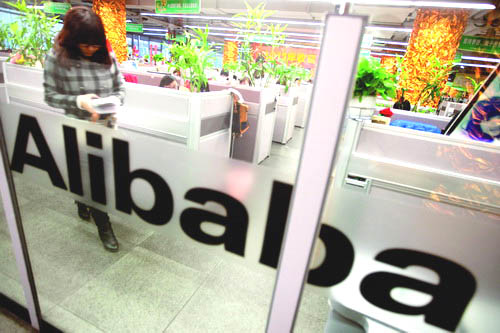|
 Alibaba.com Ltd's headquarters in Hangzhou, Zhejiang province. The company posted a 25 percent slide in first-quarter earnings, falling to 339.2 million yuan ($53.8 million). [Photo/Bloomberg] |
Alibaba.com, China's largest listed e-commerce company, recorded its lowest quarterly profit in two years, weighed down by a stagnant membership base caused by global economic woes and a shift in business models.
The slump in profit came as the company announced on Monday that shareholders are scheduled to vote in May on the $2.5 billion privatization proposal made by Alibaba Group, which owns 73 percent of Alibaba.com.
As the flagship company of the Alibaba Group, the Hong Kong-listed business-to-business platform posted a 25 percent slide in first quarter earnings, falling to 339.2 million yuan ($53.8 million).
While its revenue rose marginally to 1.59 billion yuan, total paying members on its international and China marketplaces slumped to about 754,000, representing a 9.4 percent decrease year-on-year.
As the company connects Chinese businesses with overseas buyers, more than half of its sales come from the international marketplace, tying its performance to global economic fortunes.
Revenue from the international marketplace was 916.2 million yuan in the period, which remained flat year-on-year but dropped 3.1 percent quarter-on-quarter mainly due to a lower paying membership base.
The company attributed the deterioration in profit to "its refocus on enhancing information quality and membership quality instead of boosting the number of paying members".
Jonathan Lu, executive director of Alibaba.com, warned investors in the statement that its financial performance and membership growth would suffer, as it shifts to a value-added-services model from a subscription-based service.
Earnings per share came in at 8.4 HK cents (1 US cent) as opposed to 10.6 HK cents in the same quarter of last year.
But the company is awash with 11.7 billion yuan in cash, up 24.3 percent year-on-year.
The financial result "highlights the challenges under the current global economic situation, and it may take longer (for Alibaba.com) to transform its business model", said Kelvin Ho, a Yuanta Securities Co Ltd analyst.
In February, Alibaba Group offered HK$13.5 in cash per share to buy the remaining 27 percent of the stakes, the same price as the company's initial public offering price in 2007. According to group chairman Jack Ma, the rationale is to give minority shareholders an opportunity to realize returns while Alibaba.com implements a shift in its business strategy.
The Alibaba Group has said that the privatization offer is unrelated to possible deals to buy back the 40 percent stake owned by Yahoo Inc.
Jin Yoon, an analyst at Nomura Holdings Inc, who tracks Alibaba's stocks, believed the move to take Alibaba.com private makes sense given the low cost of debt to fund the deal and the company's positive cash flow.
"It does make a lot of sense for Alibaba.com to go private because apparently the business has been in a bit of a free fall in the past 18 months. As the debt market looks really cheap and interest rates are at an all-time low, it is a win-win situation for shareholders and the management," he told CNBC News.
Richard Ji, managing director of Morgan Stanley Asia Ltd, believed the Alibaba Group will enjoy more flexibility to restructure its business after the buyout.
According to Bloomberg News, Alibaba Group signed a $3 billion loan agreement with six banks on Tuesday and is likely to seek more lenders to underwrite the loan.
Alibaba Group split its customer-to-customer and business-to-customer units last year to beef up the growth of its business-to-customer arm Tmall.
"Alibaba.com is going to struggle in the near term because there are a lot more customers leaving their website than actually joining," said Yoon.
"But the real appeal is the Alibaba Group, where the likes of Taobao and Tmall are the crown jewels of the company. So the beauty of the company lies there, not with Alibaba.com."
